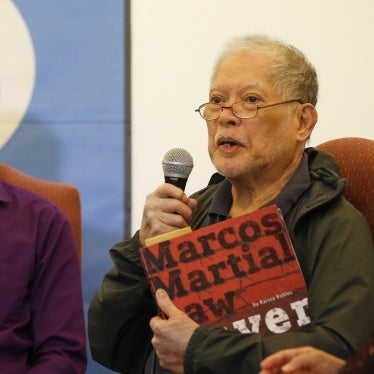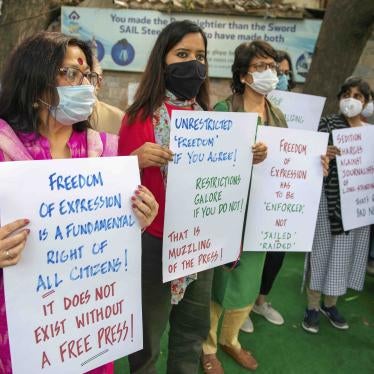A prime beneficiary of U.S. and British attacks against the Taliban is the Northern Alliance, a coalition of opposition groups that holds Afghanistan's seat at the United Nations. The alliance is part of a broader emerging group that includes the former king, Mohammed Zahir Shah, other leaders from the dominant Pashtun ethnic group and even Taliban defectors.
As it supports local commanders, the United States should consider carefully the dismal human rights records of some of its new allies.
From 1992 to 1997, forces that are now part of the alliance shelled civilian neighborhoods in Kabul and looted, raped and killed civilians there and in other parts of the country.
Among the commanders whose forces were implicated in these abuses were Abdul Rashid Dostum, an ethnic Uzbek leader previously allied with the Soviet-backed government, Abdul Rasul Sayyaf, head of the Sunni Islamist party Ittihad-i Islami, and Ahmed Shah Massoud, who was assassinated on Sept. 9.
Here are examples of abuses committed by their forces:
On Jan. 5, 1997, planes belonging to General Dostum's militia dropped cluster munitions on residential areas of Kabul. Several civilians were killed and others wounded.
In March 1995, Massoud forces were responsible for rape and looting after they seized control of Kabul's predominantly Hazara neighborhood of Karte Seh.
On the night of Feb. 11, 1993, the Massoud and Sayyaf forces conducted a raid in west Kabul, killing Hazara civilians and committing widespread rape. Estimates of fatalities range from 70 to more than 100.
No Afghan commander from this period has been held accountable for violations of international humanitarian law. Nor has the alliance indicated any willingness to bring to justice any of its commanders.
Now accountability appears to have taken a back seat to expediency as America hastily assembles and supports a broad opposition to the Taliban.
Secretary of Defense Donald Rumsfeld has indicated that the United States plans to provide forces opposing the Taliban in Afghanistan with financial and possibly military assistance. The alliance already receives military support from Iran and Russia, both of which seek to curtail Pakistan's extensive involvement in Afghanistan. Russia also fears Taliban support of Islamic insurgents in its former republics in Central Asia.
Some of the current air strikes appear aimed at Taliban front-line positions. Once these are destroyed, the alliance will face a relatively open road to recapture key cities such as Kabul, Herat on the border with Iran and Mazar-i-Sharif in the north.
If a violent transition takes place, there will be a great risk of ethnically targeted abuses. In the past two years the Taliban have carried out large-scale civilian massacres in parts of northern Afghanistan. They have destroyed homes, farmland and irrigation systems. With a narrow ethnic base rooted in the country's northern minorities, some of whom have directly suffered from these depredations, the alliance will be ill-placed to prevent reprisals by its forces against groups seen to havebenefited from Taliban rule.
The likelihood of increased abuses against minorities by the Taliban as its grip on power loosens is also high.
America and its allies ought to choose their Afghan allies carefully. They have the leverage to do so. If America provides unqualified material and political assistance to opposition forces, it could embolden commanders who have committed atrocities in the past.
The Bush administration has a profound interest in not portraying itself as aligned with brutal forces that may commit further abuses. If strong signals are sent now that human rights violations will not be tolerated, maybe Afghan civilians will have something good to look forward to.
Mr. Hiltermann is the Arms Division director for Human Rights Watch, whose Afghanistan researcher, Mr. Parekh, recently returned to New York from interviewing Afghan refugees in Pakistan. They contributed this comment to the International Herald Tribune.







